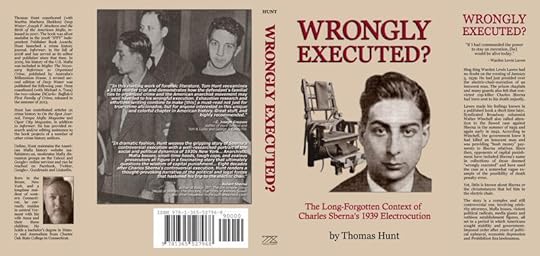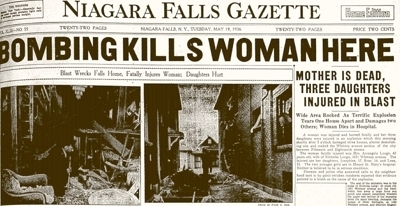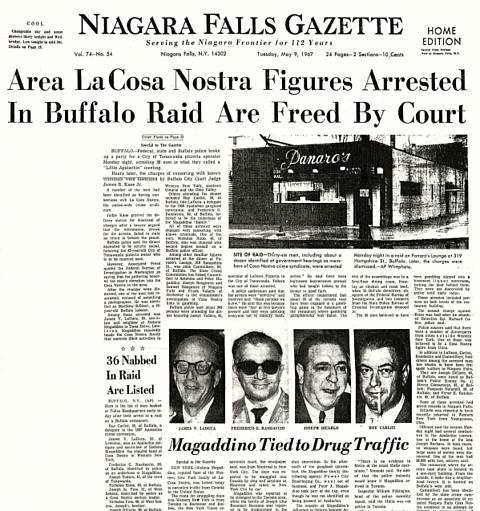Thomas Hunt's Blog, page 2
November 26, 2016
'Wrongly Executed?' book now available
Sing Sing Warden Lewis Lawes had no doubt on the evening of January 5, 1939: He had just presided over the electric-chair-execution of an innocent man. The prison chaplain and many guards also felt that convicted cop-killer Charles Sberna had been sent to his death unjustly.
Lawes made his feelings known in a published book a short time later. Syndicated Broadway columnist Walter Winchell also called attention to the flawed case against Sberna in the summer of 1939 and again early in 1942. According to Winchell, the government knew that District Attorney Thomas Dewey's office had sent an innocent man to the chair and was providing "hush money" payments to Sberna relatives. Since then, opponents of capital punishment have included Sberna's name in collections of those deemed "wrongly executed" and have used the case as a somewhat vague example of the possibility of death penalty error. Still, little is known about Sberna or the circumstances that led him to the electric chair.

The story is a complex and controversial one, involving celebrity attorneys, Mafia bosses, violent political radicals, media giants and ruthless establishment figures, all set in a period in which Americans sought stability and government-imposed order after years of political upheaval, economic depression and Prohibition Era lawlessness.
A fair trial may have been denied to Charles Sberna. Given the mood of the time, the background of the defendant and the circumstances of the case, a truly fair trial may have been impossible.

Wrongly Executed? - The Long-forgotten Context of Charles Sberna's 1939 Electrocution
Wrongly Executed? - The Long-Forgotten Context of Charles Sberna's 1939 Electrocution is now available in hardcover, paperback and ebook formats. (At the moment, only the Kindle ebook shows up here on Goodreads.) For more information and purchase options, visit the Wrongly Executed? website: http://mafiahistory.us/wronglyexecuted/
(I wish to express my appreciation to Christian Cipollini, C. Joseph Greaves, Ellen Poulsen and Robert Sberna for their support and assistance on this project.)
Lawes made his feelings known in a published book a short time later. Syndicated Broadway columnist Walter Winchell also called attention to the flawed case against Sberna in the summer of 1939 and again early in 1942. According to Winchell, the government knew that District Attorney Thomas Dewey's office had sent an innocent man to the chair and was providing "hush money" payments to Sberna relatives. Since then, opponents of capital punishment have included Sberna's name in collections of those deemed "wrongly executed" and have used the case as a somewhat vague example of the possibility of death penalty error. Still, little is known about Sberna or the circumstances that led him to the electric chair.

The story is a complex and controversial one, involving celebrity attorneys, Mafia bosses, violent political radicals, media giants and ruthless establishment figures, all set in a period in which Americans sought stability and government-imposed order after years of political upheaval, economic depression and Prohibition Era lawlessness.
A fair trial may have been denied to Charles Sberna. Given the mood of the time, the background of the defendant and the circumstances of the case, a truly fair trial may have been impossible.

Wrongly Executed? - The Long-forgotten Context of Charles Sberna's 1939 Electrocution
Wrongly Executed? - The Long-Forgotten Context of Charles Sberna's 1939 Electrocution is now available in hardcover, paperback and ebook formats. (At the moment, only the Kindle ebook shows up here on Goodreads.) For more information and purchase options, visit the Wrongly Executed? website: http://mafiahistory.us/wronglyexecuted/
(I wish to express my appreciation to Christian Cipollini, C. Joseph Greaves, Ellen Poulsen and Robert Sberna for their support and assistance on this project.)
Published on November 26, 2016 04:56
•
Tags:
anarchists, capital-punishment, death-penalty, dewey, electric-chair, lawes, mafia, sberna, terrorism, winchell, wrongly-executed
June 2, 2016
Wrongly executed?
Just finishing up a manuscript on the controversial Charles Sberna case of the late 1930s.
Sberna is often mentioned as an innocent victim of capital punishment - convicted of killing a police officer, he was executed in Sing Sing Prison's electric chair in 1939. Though codefendant Salvatore Gati admitted responsibility for the crime and insisted that Sberna was not present, a jury chose to believe evidence introduced by Thomas Dewey disciple Jacob Rosenblum. Jurors did not suspect that Dewey, Rosenblum and other involved individuals may have had agendas that went beyond the interests of justice in the case.
The story is a complex one, involving celebrity attorneys, Mafia bosses, violent political radicals, media giants and ruthless establishment figures. And it is set in a period in which Americans sought stability and government-imposed order after years of political upheaval, economic depression and Prohibition Era lawlessness.
With the great fun of researching and writing now concluding, I will soon begin the strenuous task of finding a publisher.
Sberna is often mentioned as an innocent victim of capital punishment - convicted of killing a police officer, he was executed in Sing Sing Prison's electric chair in 1939. Though codefendant Salvatore Gati admitted responsibility for the crime and insisted that Sberna was not present, a jury chose to believe evidence introduced by Thomas Dewey disciple Jacob Rosenblum. Jurors did not suspect that Dewey, Rosenblum and other involved individuals may have had agendas that went beyond the interests of justice in the case.
The story is a complex one, involving celebrity attorneys, Mafia bosses, violent political radicals, media giants and ruthless establishment figures. And it is set in a period in which Americans sought stability and government-imposed order after years of political upheaval, economic depression and Prohibition Era lawlessness.
With the great fun of researching and writing now concluding, I will soon begin the strenuous task of finding a publisher.
Published on June 02, 2016 06:08
•
Tags:
capital-punishment, dewey, electric-chair, gati, new-york, rosenblum, sberna
February 14, 2015
"What's coercion?"
On this date in 1938: Buffalo Mafia member Joseph DiCarlo is arrested.
But (he says) he doesn't understand why.
Click here to read a bit more about it.

But (he says) he doesn't understand why.
Click here to read a bit more about it.

July 1, 2014
John Montana's birth
On this date in 1893 - John Montana, later a successful businessman and Mafia leader in Buffalo, is born in Montedoro, Sicily.
Read more about Montana on the DiCarlo book website: http://buffalomob.blogspot.com/2013/09/john-montana-july-1-1893-march-18-1964.html
Read more about Montana on the DiCarlo book website: http://buffalomob.blogspot.com/2013/09/john-montana-july-1-1893-march-18-1964.html
May 31, 2014
Brief bio of Filippo Mazzara
A brief biography of Buffalo Mafia leader Filippo Mazzara has been added to the DiCarlo book website: LINK
Mazzara, a native of Castellammare del Golfo, Sicily (hometown of Stefano Magaddino and Joseph Bonanno), is discussed in Volume I of DiCarlo: Buffalo's First Family of Crime.

Mazzara, a native of Castellammare del Golfo, Sicily (hometown of Stefano Magaddino and Joseph Bonanno), is discussed in Volume I of DiCarlo: Buffalo's First Family of Crime.

May 19, 2014
78 years ago - Explosion takes life of Magaddino sister
On this date in 1936 - Stefano Magaddino's sister, Arcangela Longo, is killed in an early morning bomb explosion.
Longo and her family lived next door to Magaddino on Whitney Avenue in Niagara Falls, NY. Her husband Nicholas was visiting New York City at the time of the explosion. Their three daughters were injured in the blast.

DiCarlo: Buffalo's First Family of Crime - Vol. I
Longo and her family lived next door to Magaddino on Whitney Avenue in Niagara Falls, NY. Her husband Nicholas was visiting New York City at the time of the explosion. Their three daughters were injured in the blast.

DiCarlo: Buffalo's First Family of Crime - Vol. I
May 8, 2014
47 years ago: Panaro's Lounge raid
On this date in 1967 - Buffalo police raid a bachelor party at Panaro's Lounge and find 37 underworld figures in attendance. (Image of Niagara Falls Gazette from May 9, 1967.)

DiCarlo: Buffalo's First Family of Crime

DiCarlo: Buffalo's First Family of Crime
Published on May 08, 2014 08:46
•
Tags:
1967, buffalo, dicarlo, panaro-s-lounge
January 19, 2014
DiCarlo questioned by Kefauver Committee
On this date in 1951, Joseph DiCarlo, overseer of Mafia gambling rackets in Youngstown, Ohio, was questioned by the U.S. Senate's Kefauver Committee in Cleveland.
Aside from providing personal background information, he refused to answer or insisted that he could not answer many of the committee's questions. DiCarlo claimed not to recall or to understand specific charges that resulted in convictions and imprisonments. His attorney, Russell Mock of Youngstown, frequently objected to questions, noting that they were often related to matters long ago or to offenses that were unrelated to interstate commerce - the stated focus of the Kefauver Committee's attention.
Committee members challenged DiCarlo's right to refuse to answer questions other than those that might expose him to federal prosecution. Following his appearance, DiCarlo was indicted on eight counts of contempt of Congress. He was acquitted in federal court on Feb. 7, 1952.
(From DiCarlo: Buffalo's First Family of Crime - Volume II)

Aside from providing personal background information, he refused to answer or insisted that he could not answer many of the committee's questions. DiCarlo claimed not to recall or to understand specific charges that resulted in convictions and imprisonments. His attorney, Russell Mock of Youngstown, frequently objected to questions, noting that they were often related to matters long ago or to offenses that were unrelated to interstate commerce - the stated focus of the Kefauver Committee's attention.
Committee members challenged DiCarlo's right to refuse to answer questions other than those that might expose him to federal prosecution. Following his appearance, DiCarlo was indicted on eight counts of contempt of Congress. He was acquitted in federal court on Feb. 7, 1952.
(From DiCarlo: Buffalo's First Family of Crime - Volume II)

January 12, 2014
DiCarlo on Google+
A new page has been set up on the Google+ service for discussion of DiCarlo: Buffalo's First Family of Crime (Vols. I and II). Visit the page by clicking here.


December 18, 2013
Montana among those convicted after Apalachin
On this date in 1959, John Montana of Buffalo was one of 20 Apalachin Mafia convention attendees convicted in federal court of obstructing a government investigation. The maximum possible sentence was five years in prison.
Montana, a prominent and politically connected businessman in Buffalo, served as local overseer of the Niagara Falls-headquartered Magaddino Crime Family. Taken into custody as he fled Joseph Barbara's Apalachin home in November 1957, Montana insisted that he was there entirely by accident and had no knowledge of the underworld convention taking place.
The others convicted were Russell Bufalino of PA, Ignatius Cannone of NY, Paul Castellano of NY, Joseph Civello of TX, Frank DeSimone of CA, Natale Evola of NY, Louis Larasso of NJ, Carmine Lombardozzi of NY, Joseph Magliocco of NY, Frank Majuri of NJ, Michele Miranda of NY, John Ormento of NY, James Osticco of PA, Joseph Profaci of NY, Anthony Riela of NJ, John Scalish of OH, Angelo Sciandra of PA, Simone Scozzari of CA, Pasquale Turrigiano of NY.

Montana, a prominent and politically connected businessman in Buffalo, served as local overseer of the Niagara Falls-headquartered Magaddino Crime Family. Taken into custody as he fled Joseph Barbara's Apalachin home in November 1957, Montana insisted that he was there entirely by accident and had no knowledge of the underworld convention taking place.
The others convicted were Russell Bufalino of PA, Ignatius Cannone of NY, Paul Castellano of NY, Joseph Civello of TX, Frank DeSimone of CA, Natale Evola of NY, Louis Larasso of NJ, Carmine Lombardozzi of NY, Joseph Magliocco of NY, Frank Majuri of NJ, Michele Miranda of NY, John Ormento of NY, James Osticco of PA, Joseph Profaci of NY, Anthony Riela of NJ, John Scalish of OH, Angelo Sciandra of PA, Simone Scozzari of CA, Pasquale Turrigiano of NY.




